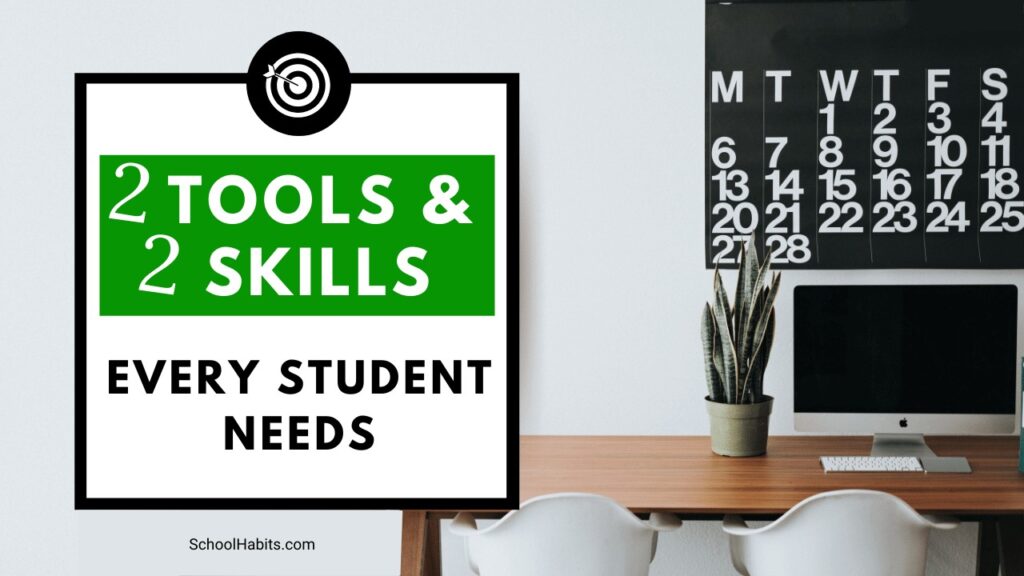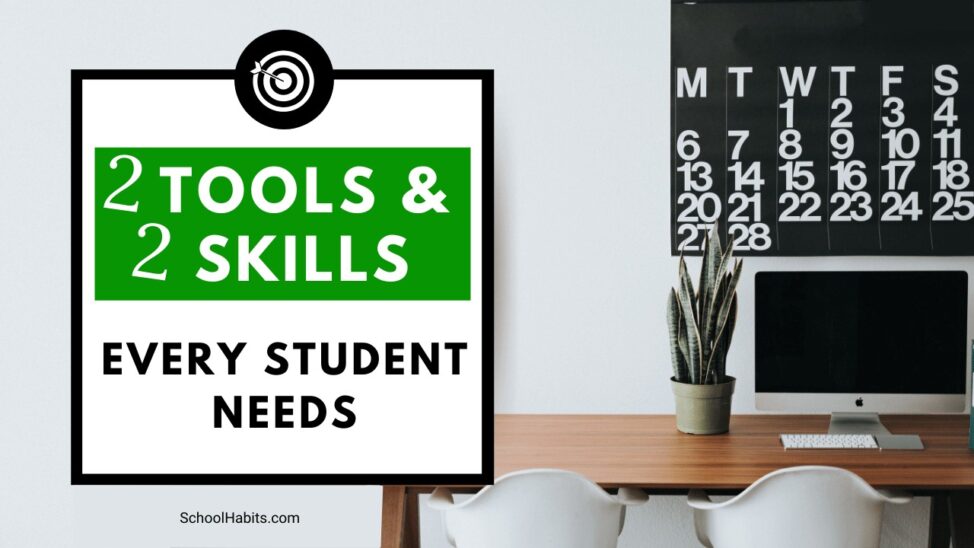By Katie Azevedo, M.Ed.

The internet is full of student tips that claim you can cut your study time in half, get an A on your essay without trying, and hack your way through school via some secret portal that no one knows about.
This post, on the other hand, is realistic.
I’m sharing with you two tools and two skills that every student needs to get through school successfully. These student tips may seem basic, but they are arguably the most important tools and skills you can have as a learner.
Two tools every student needs
Ignore the flashy, fancy, bright shiny objects: you don’t need any insanely complicated or expensive tools to manage your student life. The two most important tools you need are a calendar and an assignment notebook (task tracker). There is an important difference between the two, which you should know.
1. Calendar
Students in sixth grade and above should be managing their own calendars. A calendar allows you to keep track of appointments, after-school activities, due dates, dates of tests and quizzes, and anything else that’s time-sensitive (other than homework). Calendars are also excellent for time-blocking, which is a fantastic time-management strategy for getting a reality check about how much free time you really have in a day.
Should you use a digital calendar or an analog calendar? Use whatever you like and will commit to. Google Calendar is my personal favorite (it’s free and has everything a student would need in a calendar), but you have to figure this one out for yourself. Here is my complete step-by-step tutorial on using Google Calendar for school. It’s a good one. Trust me.
2. Assignment notebook (task tracker)
Every student needs a way to keep track of homework assignments and other school-related tasks. Many schools use some kind of learning management system (LMS) like Google Classroom or Canvas, but I argue that you should not rely on these tools to keep track of your homework.
Here’s why you shouldn’t use your LMS as your assignment notebook:
- It is designed primarily as a portal through which to submit homework, not manage homework.
- It is only as useful as the information that’s put into it – and not all teachers use it adequately.
- You have no control over your LMS in the sense that you can’t add tasks or reminders to it.
Every student needs a dedicated assignment notebook that’s separate from their LMS. You can use a digital tool or something analog, although I argue that analog is better for most students. Here’s exactly how to pick and use an assignment notebook, and here are some assignment notebook hacks.
Two skills every student needs
This list could be very long, but I’m purposely limiting it to the top two skills that are non-negotiable for school success.
1. Study skills
Many students go through school being told that they need to learn content for a test, but they are seldom taught how to learn. That’s literally the entire point of SchoolHabits.com – to teach students how to learn the things.
With that said, study skills are one of the keys to avoiding burnout, stress and feeling overwhelmed because good study skills help us learn information quicker and more thoroughly. The two most important study methods you should know are spaced repetition and active recall, but you should have an arsenal of 5-6 study techniques that you know how to use and that work for you. Experiment with a bunch, and settle on a few. All of my study skills resources and tips are right here.
2. Resourcefulness
Resourcefulness is a superpower, even well beyond school. Resourcefulness is our ability to independently overcome and solve problems. So, what do you do when you’re confused? How do you figure out hard things? What do you do when you get stuck? How well do you manage missing work when you’re absent from school? How confident are you in asking a teacher for help?
The opposite of resourcefulness is learned helplessness. Some signs that you should work on your resourcefulness skills are that you blame the teacher when you don’t understand something, overly rely on the excuse of “it’s too hard,” don’t take responsibility for your actions or your learning, wait until the last minute before reaching out for help (if at all), and regularly use “I don’t understand it” as an excuse for not completing work.
Being resourceful means doing everything possible to figure out things on your own before giving up or asking for help. Don’t understand your math homework? Watch a YouTube video about it or … brace yourself … look at your textbook(!). Don’t know what goes next in your essay? Look at some of your past essays to see how you structured your writing, and mirror that. Or better yet, read the guidelines your teacher gave you even if you don’t want to.
Student tips: Final notes
The number of tools available to students these days – both digital and otherwise – is overwhelming. And so is the number of pseudo study hacks that mislead students about how hard learning actually is. The solution is to keep it simple: use a basic calendar and an assignment notebook, use a few legitimate study skills that you know work for you, and focus on developing your resourcefulness.

